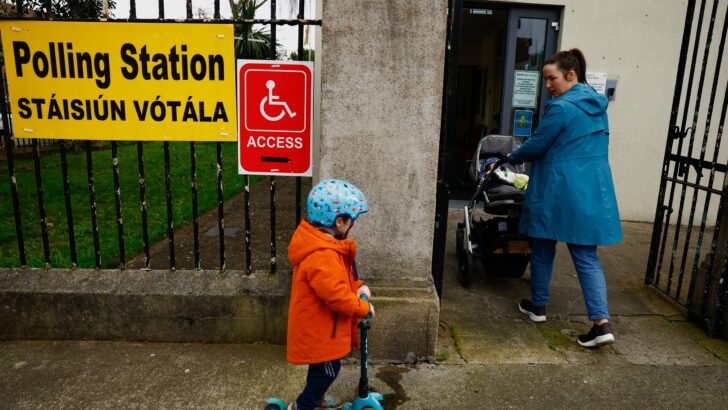Last week, we held another national election. It was a case of nothing changed, utterly no change, and yet something terrible was born – and boy, it was not beautiful: Fianna Fáil, Fine Gael, Sinn Féin – a three-headed Cerberus guarding the gates of Dáil Eíreann. For all the concerned talk on the national airwaves over the last year or two about the “rise of the far-right”, we saw no evidence of it in the elections. Newer parties like Aontú struggled to gain ground in a political environment that favours those already established – and in receipt of state funding on which they themselves vote – and makes it next to impossible for new faces and new parties to make an impact.
It is hard to know what is worse: the same old faces and same old parties being voted back in, or the apathy and complete lack of hope amongst voters that something new could happen. As elections go, I don’t think I can remember one being more of a damp squib than this. I rarely hear talk among voters that sounds enthusiastic about political candidates. Instead, the talk more often approximates to: “Who is the least bad option?” or, “How should I vote to keep X or Y out?” I have long thought that it is a tenuous claim for politicians to insist they have a mandate, when few of them crack 20% in their own constituency, and many who voted for them did so holding their nose, in an effort to keep someone else out.
Flaws
The truth is that our political system is flawed on many levels.
First, the Dail is in session too often and for too long. The expectation that politicians will almost constantly be in attendance makes it very difficult for anyone who has a family (and likes spending time with them) to make the commitment and meet the demands and long hours of the job.
It could be different: the Swiss Parliament sits only 12 weeks out of the year; the lower house of the Austrian Parliament met in plenary session for just 27 days in the year, whilst its upper chamber sat for just 13 days. The Texas legislature sits only every second year, and was last in session in 2023! This means that politicians in these countries have more time to do other things, whether that is pursuing another career, or spending time with family. By contrast, the Oireachtas generally sits Tuesday to Thursday every week from September to July, more or less following the school year and making it very difficult for those with young children.
Another problem with keeping a legislature constantly in session is that it has to find something to do to justify its existence. In Ireland, this consists of a great deal of redundant commentary by politicians on whatever journalists decide is “news”, combined with the occasional passage of a new law – which usually makes things worse rather than better – see, for instance, the recent so-called “Hate Speech” Bill. To me, this all smacks of “busy work” by politicians looking to tell their voters back home that they did something, or got something “through” the Dáil. The truth is that we have far too many laws already. If the Oireachtas did nothing for the next five years other than repeal and consolidate our legislation, its members would be doing our country a service.
Second, our political culture, and our expectations of what our politicians will do for us personally, tend to favour candidates who have no convictions about anything – who will say or do anything to get votes. The Irish approach is to avoid conflict, express as few opinions as possible in order to avoid alienating any section of the electorate, and fudge any issue that it is possible to fudge. What Irish politics is badly missing are politicians who reflect on the influence of politics on the culture, who understand what the end of man is, and who consider what the common good requires – or even acknowledge that there is a common good – and consequently how politics should be ordered.
Third, you may think that our model of having 3-, 4-, and 5-seater constituencies is preferable to the British or US model. But one of its costs is that it makes it much more difficult to effect any real governmental change. UK parliamentary constituencies are designed on a system by which one MP represents one constituency – constituents unhappy with their MP can vote them out in the knowledge that voting for a different MP (and party) can mean a real change. The American binary system of Democrat and Republican may have its drawbacks, but it means that if voters really want a change of direction in government (as seems to have been the case this year in the US), the electorate can make it happen.
Differences
The last time there was a single-party majority government in Ireland was the 25th Dáil in 1987, under Charles Haughey. Since then, it has been a case of Lanigan’s Ball with the main parties stepping in and stepping out again in a long succession of coalition governments, and little to no change in political trajectory. As the years have passed, there is less and less to distinguish the parties one from another; they may quibble over tax rates, but there is little difference in terms of their values. Even Sinn Féin, once marked out as the party non grata, with its ties to the IRA, has little to differentiate it from any of the other parties. As one radio commentator said last week, the truth is that Fianna Fáil and Fine Gael are more like a single party on almost 43% than two parties on 22% and 21% respectively – a true “uni-party” with no real convictions about anything other than “progress” and a horror of being seen as regressive, old-fashioned, or intolerant – much like Sinn Féin. The genius of the two larger parties is that they have left behind the civil war politics for a bargain that gives their boys jobs for life. If they were to amalgamate into a single party, the chances are that, every few years, they might find themselves out of power. But keeping up the old appearances of two separate parties, while their leaders practically wink at each other across the RTE television studio, allows them to maintain the illusion of “choice” for voters. Welcome to the new government, same as the old government.


 Maria Steen
Maria Steen A woman arrives with children at a polling station in Dublin March 8, 2024, to vote on a referendum to redefine family and delete wording on stay-at-home mothers in the Irish Constitution. (OSV News photo/Reuters, Clodagh Kilcoyne)
A woman arrives with children at a polling station in Dublin March 8, 2024, to vote on a referendum to redefine family and delete wording on stay-at-home mothers in the Irish Constitution. (OSV News photo/Reuters, Clodagh Kilcoyne) 